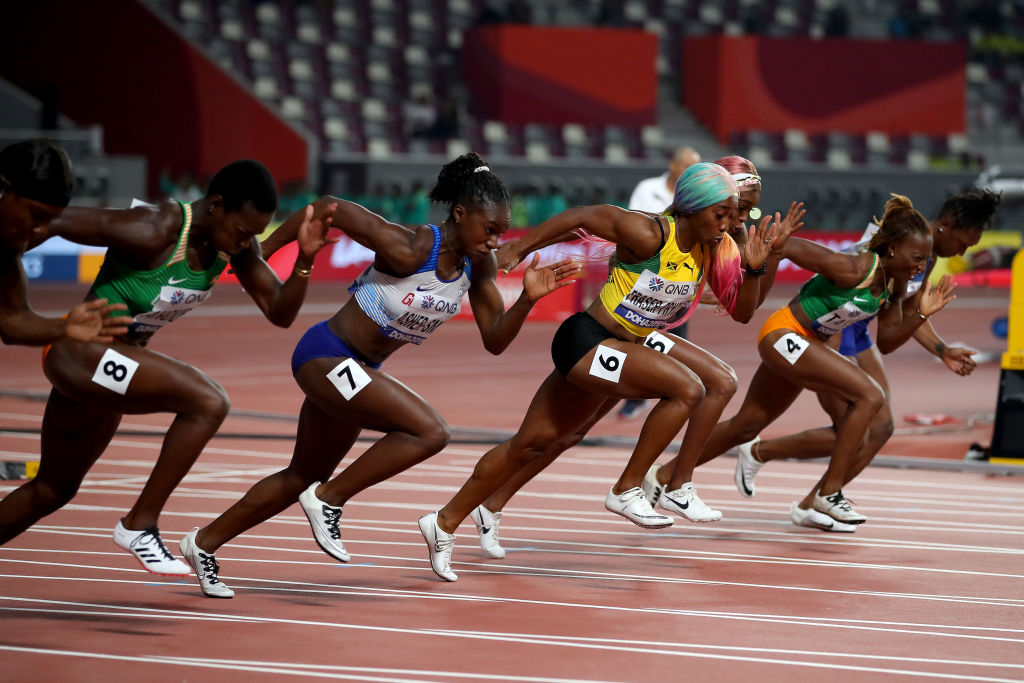The Women's 100m final is one of the most anticipated events in athletics, showcasing the incredible speed, talent, and determination of female sprinters from around the globe. This race not only highlights the athletes' physical prowess but also serves as a stage for inspiring stories of perseverance and dedication. In this article, we will delve into the history, key athletes, records, and the excitement surrounding the Women’s 100m final, providing a comprehensive overview for fans and newcomers alike.
As we explore the nuances of this thrilling event, we will cover the evolution of women's sprinting, the impact of major competitions, and the incredible journeys of some of the top athletes who have graced the track. The Women's 100m final is more than just a race; it is a celebration of female empowerment and sportsmanship. Join us as we uncover the fascinating world of women's sprinting and what makes the 100m final a must-watch event.
With the spotlight on the athletes and the stakes higher than ever, the Women's 100m final continues to captivate audiences worldwide. Whether you are a long-time fan or new to the sport, this article will provide you with everything you need to know about one of athletics' most exhilarating events.
Read also:Uncovering The Legacy Of Mike Wolfe A Journey Through Time
Table of Contents
- History of Women's 100m Final
- Key Athletes in Women's 100m
- Records in Women's 100m Final
- Major Competitions Featuring the Women's 100m Final
- Training and Preparation for the 100m Final
- Impact of Technology on Women's Sprinting
- The Future of Women's 100m Final
- Conclusion
History of Women's 100m Final
The Women's 100m final has a rich history that dates back to the early 20th century. The event was first introduced to the Olympic Games in 1928, marking a significant milestone in women's athletics. Since then, the 100m final has evolved into one of the most prestigious events in track and field, drawing the attention of millions worldwide.
Milestones in Women's Sprinting
- 1928: Women's 100m debuts at the Amsterdam Olympics.
- 1932: The first Olympic champion in women's 100m, Helen Stephens, emerges.
- 1980s: The rise of legendary sprinters like Florence Griffith-Joyner, who set the world record that still stands today.
- 2000s: The emergence of new talents such as Shelly-Ann Fraser-Pryce and Elaine Thompson-Herah.
Key Athletes in Women's 100m
Over the years, several athletes have made their mark in the Women's 100m final, showcasing their extraordinary talent and determination. Here are some of the most influential sprinters in the history of the event.
Notable Sprinters
| Name | Country | Achievements |
|---|---|---|
| Florence Griffith-Joyner | USA | World Record Holder (10.49s) |
| Shelly-Ann Fraser-Pryce | Jamaica | Multiple Olympic Gold Medalist |
| Elaine Thompson-Herah | Jamaica | Olympic Champion 2016 and 2020 |
| Carol Lewis | USA | Olympic Gold Medalist and World Champion |
Records in Women's 100m Final
The Women's 100m final is synonymous with speed, and numerous records have been set and broken throughout its history. These records not only reflect the athletes' exceptional abilities but also serve as benchmarks for aspiring sprinters.
Current World Records
- World Record: 10.49 seconds (Florence Griffith-Joyner, 1988)
- Olympic Record: 10.61 seconds (Elaine Thompson-Herah, 2021)
- World Championship Record: 10.70 seconds (Dafne Schippers, 2015)
Major Competitions Featuring the Women's 100m Final
Several prestigious events showcase the Women's 100m final, providing a platform for athletes to compete at the highest level. These competitions are not only crucial for the athletes' careers but also for fans who eagerly await thrilling performances.
Key Competitions
- Olympic Games
- IAAF World Championships
- Diamond League
- Continental Cup
Training and Preparation for the 100m Final
Success in the Women's 100m final requires rigorous training and preparation. Athletes dedicate countless hours to perfecting their techniques, building strength, and improving their speed.
Training Regimens
- Sprint drills and technique refinement
- Strength training and conditioning
- Nutrition and recovery strategies
- Mental preparation and visualization techniques
Impact of Technology on Women's Sprinting
Technology has played a significant role in advancing the sport of athletics, particularly in women's sprinting. From improved track surfaces to innovative training tools, technology continues to enhance performance and safety.
Read also:Exploring The Lives And Achievements Of Phil Robertsons Children A Deep Dive Into The Duck Dynasty Legacy
Technological Advancements
- High-speed cameras for technique analysis
- Wearable devices for performance tracking
- Advanced footwear technology for optimal speed
The Future of Women's 100m Final
The future of the Women's 100m final looks bright, with an influx of young talent and increasing global interest in women's athletics. As more female athletes break barriers and set new records, the excitement surrounding this event will only continue to grow.
Emerging Talents
- New athletes from developing countries making their mark
- Increased investment in women's sports
- Greater visibility and media coverage of women's events
Conclusion
In summary, the Women's 100m final is a testament to the incredible speed, strength, and skill of female athletes. With a rich history, remarkable records, and inspiring athletes, this event continues to captivate audiences around the world. We invite you to share your thoughts on the Women's 100m final in the comments below and explore more articles on our site to stay updated on the latest in athletics.
Thank you for reading! We hope you enjoyed learning about the Women's 100m final and its significance in the world of sports. Be sure to visit us again for more exciting content!
Article Recommendations


